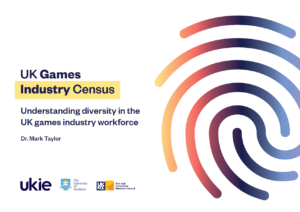UKIE and Dr. Mark Taylor of the University of Sheffield in the UK have published a new Games Industry Census which gives some good insights into the employment of women and black, Asian or minority ethnic (BAME) people in the British games industry.
Funded via the Arts & Humanities Research Council, this independent analysis focuses on three main areas: the kinds of work that games industry workers do, their personal characteristics, and their backgrounds.
The census was completed by over 3,200 games workers, or around 20% of the overall workforce, between September and October 2019. By using both open and targeted recruitment methods, they were able to ensure a representative sample of people working across the sector.
Key findings of interest:
*The games sector is a young industry, with two thirds of people working in the sector aged 35 or under. But 54% of people in the industry have worked in the sector for five years or more.
*10% of people working in games are Black, Asian or minority ethnic (BAME). This is a slightly higher percentage than in the national working population, and higher than both the overall creative industries and specific sectors such as music, publishing and film/TV. However, it is lower than the equivalent figure for IT and software, as well as below the average in the working-age population. While BAME workers can be found broadly equally in all job roles, with a small skew towards more non-sector specific roles, they are noticeably less represented in senior positions.
*70% of people working in the games industry are male, compared to 28% female and 2% non-binary workers. Female representation in the workforce is significantly under the national average of those in work, as well as less than in cultural and creative roles more generally, but is similar to the proportion of women working in Film/TV, and above that of the general IT/software sector.
*81% of the industry is educated to at least undergraduate level, rising to 88% for core games production roles in art or programming. This is considerably above the 57% average for the cultural and creative industries. 27% of workers hold a game-specific qualification, rising to over half of workers in games design and art roles. More commonly, workers have qualifications in STEM subjects at 31%, increasing to 60% for workers in programming roles.
*21% of people working in games are LGBTQ+, while 79% are heterosexual. This is a significantly high proportion of LGBTQ+ workers, with other data sources indicating that heterosexual people make up between 93-97% of the national population. At 2%, non-binary representation in the UK games industry workforce is higher than the national average, which is estimated at 0.4%. Trans people make up 3% of the games industry workforce, which again is above the estimated 1% within the national population.
*21% of people working in the games industry live with a chronic physical health condition. This is higher than the overall working-age population, where 13% report long term physical issues.
*31% of respondents reported that they live with anxiety, depression or both, considerably above the national average of 17%. Individuals working in junior or mid-level roles were more likely to report that they had anxiety and/or depression, with higher levels of depression also reported among Directors/CEOs of smaller companies.
*3.5% of respondents reported that they worked 51 hours per week or more. Three quarters of all respondents reported working a standard full-time working week of between 33-40 hours.
You can download the full report at https://ukie.org.uk/sites/default/files/cms/docs/UK_Games_Industry_Census_2020_FINAL_DIGITAL_0.pdf

